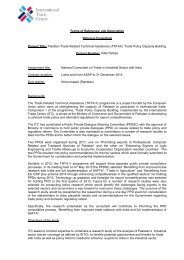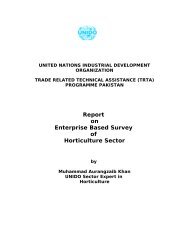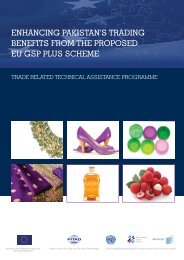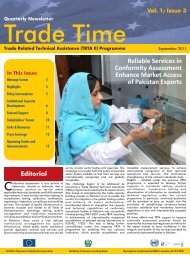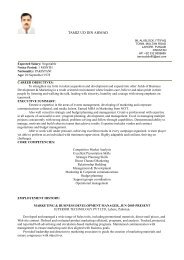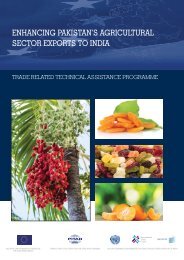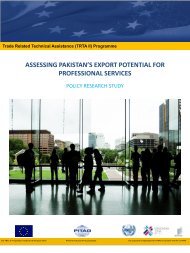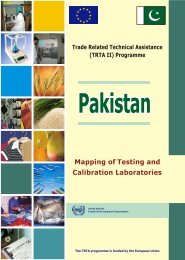Enhancing dairy sector export competitiveness - International Trade ...
Enhancing dairy sector export competitiveness - International Trade ...
Enhancing dairy sector export competitiveness - International Trade ...
You also want an ePaper? Increase the reach of your titles
YUMPU automatically turns print PDFs into web optimized ePapers that Google loves.
ENHANCING DAIRY SECTOR EXPORT COMPETITIVENESS IN PAKISTANhave a subsequent impact on improving production efficiencies of the <strong>dairy</strong> farmers andproducers to effectively compete in the domestic market.Revisiting the 18 th Constitutional AmendmentThe main focus of the 18 th constitutional amendment was to provide greater autonomy to the provinces inorder to ensure better service delivery to the public. It is considered as a landmark achievement of thecurrent government. Through this amendment, the subject of agriculture previously maintained by thefederal government has been devolved to the provinces with an overall objective to give them moreautonomy in policies and actions. The federal government is now responsible for making national policy onlivestock and <strong>dairy</strong>.Impact AssessmentSince the newly formed federal Ministry for Food Security and Research is still in its infancy post the recentconstitutional amendment, it is quite early to assess its impact. The LDDB) and PDDC are trying to findsound footing in coordination with the relevant provincial departments for future development of the <strong>dairy</strong><strong>sector</strong>.Recommendations(i) It is important that the skills of the personnel employed in all relevant provincial departmentsshould further be developed to formulate and execute policies in agriculture and livestock. TheMinistry of Food Security and Research needs to take a central role in training these personnelfor the development of policies and their implementation in coordination with internationaltraining organizations.(ii) In the <strong>dairy</strong> <strong>sector</strong>, farmers being the producers are to be considered as major stakeholders bythe provinces. Therefore, it is imperative to institutionalize their participation in developingpolicy instruments for the industry. The same can be ensured through implementation of the<strong>dairy</strong> hubs which would particularly increase representation of the small holders and alsocreate a mechanism for obtaining instant feedback on the developmental initiatives. 135(iii) A key element that was central to providing autonomy in the agriculture <strong>sector</strong> wasimplementation of a structure by the provinces for collection of agricultural income tax from theproducers. It is about time that this initiative may be implemented as the contribution of the<strong>sector</strong> to the GDP stands at about 25% while its share in the tax collection is less than 1%.The provincial legislators must consider this fact and initiate an effective dialogue with therelevant stakeholders. This would help in increasing the tax to GDP ratio and also ensureincrease in provincial revenues which can be utilized for funding of development initiatives forthe agriculture <strong>sector</strong>. 136Revamping Food Safety RegimeCurrently Pakistan does not have a cohesive and clear set of regulations for either imported or domesticfood products at the federal level. Within the present structure, the federal government is solelyresponsible for regulating the food imports including <strong>dairy</strong> products while the provincial governments aremandated to enforce standards in the domestic market through relevant health and safety departments.The import regulations excessively rely on the premise that if the product is sold in the country of origin andmeets the domestic safety requirements, then it meets Pakistan’s requirements as well; thereforeestablishing a reactive rather than a proactive approach in regulating food imports. Other than the above,the focus is on ensuring adequate shelf life. 137135 Livestock Farmers and Breeders Association136Varying estimates place the revenue potential from taxing the agricultural income from PKR 40-60 billion to as high as PKR 250-300 billion. Nevertheless, the potential influx of public funds is significant in view of current economic conditions of the country(Source: Pakistan Institute of Legislative Development and Transparency (PILDAT), Briefing Paper: Taxing the Agricultural Income inPakistan, November 2011)137 At least 50% original shelf life at the time of importation of the food product into Pakistani territory83



